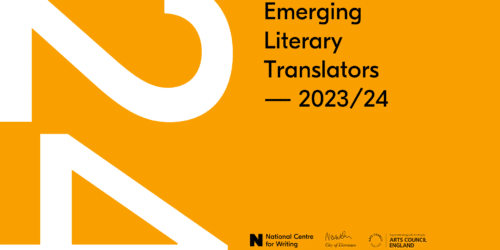
On Thursday 9th July, Kerry Hudson presented a rousing provocation to a full house at our debate on diversity at Bloomsbury Institute. Here is the provocation in full.
As a working class, queer, female writer I was welcomed with open arms into the publishing world. My debut novel was received with enthusiasm, nominated for prizes and I was invited to teach at respected institutions. The industry has been nothing but kind and supportive of my work and though I earn less than I did when I worked in a call centre, I’m rich in getting to do what I love for a living and I’m very grateful for that.
So for a while I forgot to look around and check the level of the playing field for others like me. Now I’ve viewed the skew of that field – which turns out to be more of a mountainous plane – I realise I am one of the lucky few and I am angry.
We are losing stories in the UK. We are narrowing our literary culture. We have a publishing industry which continues to perpetuate its failure to reflect the extraordinary spectrum of communities in this country and so we are losing that potential vitality, social exploration and innovation in the books we publish.
Unless we tackle this lack of inclusivity, the mountains marginalised writers must climb in order to get and stay published, we may never reach our true potential as an industry.
We are losing stories in the UK.
Let me tell you about how stories are lost, how voices remain unheard.
Imagine four writers. For our purposes let’s agree that they are talented and that they’ll write brilliant, sales-worthy books. They are BME (black, minority, ethnic, 14% of the population overall and 40% in London), LGBT (5-7% according to government figures), working-class (in the Great British Class Survey 48% were categorised as ‘below’ middle class), have a disability (19% of the population according to the Disability Rights Commission).
The BME writer studies for a creative writing MA, but only a handful of professors are BME and this is also reflected in the number of fellow-BME students. Our working class writer simply can’t afford the fees for an MA or even a part-time writing course. This writer works two jobs and writes in the evenings and on weekends even though they’ve seen few books that represent the world they want to write about. Likewise for the writer with a disability who sees few disabled characters in books, few writers with disabilities profiled in newspapers. These writers think: ‘Perhaps, my stories aren’t meant to be heard. I don’t belong.’
Still our writers persevere. They have written excellent, unique books and go in search of a literary agent, a publisher. However, the people who will read these books to decide if they are good enough and grant access, might not ‘connect’ with these books. In Spread the Word’s recent ‘Writing the Future: Black and Asian Writing in the UK’ report only 11% of publishing house respondents had recruitment ties with non-Oxbridge universities, suggesting that for 89% this was the sole graduate recruitment method, surprising given that Oxbridge graduates make up only 1% of the overall population.
Unlike many industries, audits for diversity and support groups, for instance LGBT groups, aren’t a standard in publishing. Additionally, publishers are overwhelmingly London based and entry into the profession is largely by unpaid internship, excluding those who don’t have family or spousal support to work unwaged, often for substantial periods.
Feedback comes in for our writers, variations of, ‘the writing is good, the story is original, but it didn’t speak to me. I don’t know how I’d sell this’. This is natural, to love a book it must resonate personally, it must, on some level, be representative of a society we recognise, have characters we relate to. Still, after many submissions, three of our authors do gain representation. Not so the BME writer who, like 53% of BME writers surveyed in ‘Writing the Future’, remains unagented. Instead, they find a home for their book through the hit and miss of unsolicited submission – without the support of an agent.
And so our writers are through the gates, into the kingdom. They had good stories to tell and they sell their books. Of course there are commercial concerns and the LGBT writer is asked to ‘straighten’ a few of their characters, while the BME writer’s editorial notes urge for ‘authenticity’ by which they seem to mean more ‘urban/African/recognizably “ethnic”’ though the writer is sure that the semi-autobiographic novel is authentically about their world. When it comes time to publicise the book, the disabled and working-class writers are asked to talk frankly about their personal experiences and childhood. While one welcomes the opportunity to speak about issues important to him, the other doesn’t wish to be defined by this single trait: publicity column inches reflect this decision.
Finally, the books are sent to reviewers, bookshops, Amazon warehouses. It hasn’t been easy, they’ve made compromises, but our writers are finally authors. But there’s an important detail which will affect some authors’ likelihood of achieving reviews in the broadsheets and prize listings which both contribute to getting enough sales to enable a second book – two of this gang are women. And since women are still reviewed less than their male counterparts and earn averagely 20% less, these books and authors have a greater struggle.
Where there are debuts there should naturally come second novels. Unfortunately, our BME author remains unagented even after publishing a book and is unable to place his next novel. Our disabled writer suffered from her lack of press coverage, especially since she also got fewer reviews than expected, and so didn’t sell enough to get a second book contract. The working-class writer, though accepting that he’d have to live on very little, ultimately couldn’t sustain the added unpredictability of that small income and so took a salaried job. His first book was successful; he had the best intention of writing another book but never did. The LGBT writer was nominated for two LGBT awards and was supported by the LGBT community, she had a two book contract and, though her advances reduced as years progressed, she developed a loyal readership and was able to write without concern that she might alienate the presumed ‘mainstream’ reader.
Four writers. One stays in print. The others, their future stories, are lost. The consequence? The consequence is that other emerging writers will look and fail to find voices like their own. It is young people in non-Oxbridge institutions who will have no idea that they may have potential careers in publishing and contribute to a literary culture. It is stories lost; voices unheard and a book buying public who have no idea how much of the possible spectrum of choice they are being denied.
*
Without making change and making change now we risk turning our proud literary legacy into a factory producing mono-cultural, ‘safe-ish bets’ based on the success of previously published books in similar models. An industry where books are viewed as ‘units’ to be shifted, things of financial checks and balances. And of course in part they must be; this is a business. So perhaps the case for the safeguarding of culture isn’t enough? If you are thinking of the bottom line then consider an industry that benefits from the potential disposable income of £300 billion for the BME community and approximately £80 billion each for ‘Pink Pound’ and those with disabilities . I believe the best books are created to entertain, to inspire both rational and revolutionary thinking, to contribute to an emotionally richer, better informed, intelligent society. But, if you think in pound signs then consider that even as our own books market is saturated we are able to harness our inherent diversity to perform within an increasingly competitive global market specifically because of this unique quality of our nation’s literary output.
Yet no matter how profit driven the publishing industry is compelled to be, we all understand what is being produced and sold here are not jumpers or smartphones. Books and stories are not just a business; they are a fundamental element of any evolved society. The reason that those who write, who communicate, who represent society in words are often the first to be persecuted by oppressive regimes is because words have immense power to change, influence and shape. And we must not relinquish that power by reducing it merely to profit and loss calculations.
Let’s harness the enormous power of our diversity not only to meet our current financial objectives but fulfil our future responsibilities for generations to come.
Let’s make sure a career in publishing is seen as a viable option for people of all backgrounds – ensure secondary school work experience is offered, that publishers are represented at non-Oxbridge university career fairs. For writers, let’s identify talent early and nurture that talent with mentoring schemes, official or unofficial.
In an industry where the annual profits of the Hachette Group were €197 million and Penguin Random House was €363 million , we can afford, and have a responsibility to, give more support to libraries, 337 of which have closed since 2011 in England alone, and offer book donations to the most deprived areas. Not only to inspire, plant a seed of hope and expand horizons but, more practically, to stimulate the habit, and thus the business, of reading. If we shift focus to portray the true multiplicity of society in books, young people will grow up immersed in a British cultural life that reflects their world and which fosters a creative environment that has inclusivity, innovation and collaboration at its heart.
Bursaries should be available to enable students from marginalised backgrounds to study creative subjects thus bringing the proven benefits of creativity and diversity not only to publishing but to all industries. Peer mentoring is possible if writers are recognised as being skilled workers, contributing as they do an important function to any developed society, who deserve to be paid a living wage (in the UK writers averagely earned £11,000 in 2013 which is £5000 less than the living wage), giving them time and resources to support new writers.
It’s essential to promote more diversity in agenting, editorial, marketing and sales teams
For the sake of both our cultural evolution as a nation and our industry’s ability to compete in a global market it’s essential to promote more diversity in agenting, editorial, marketing and sales teams.
Much of this provocation owes a debt to the excellent research conducted by the ‘Writing the Future: Black and Asian Writing in the UK’ report and I would call for similar reports relating to working class, LGBT and disabled individuals and communities working in publishing. I echo many of the report’s recommendations, particularly regarding the improvement of diversity ratios by publishers signing up to the Equip Publishing Equality Charter which helps promote equality across UK publishing, bookselling and agenting, by driving forward change and increasing access to opportunities within the industry. Like most industries, audits on diversity retention and progression, diversity training, LGBT groups and wider recruitment avenues should be implemented. Alongside an industry ban of unpaid internships and introduction of a living wage for entry level publishing employees. This could herald the start of a movement to create a workforce which is able to relate to, and champion, more diverse voices thus making them more visible.
I don’t believe anyone in the industry is unconcerned by its lack of diversity. I have nothing but respect for my colleagues in writing and publishing who I know to be incredibly hard working, passionate and intelligent with genuine integrity regarding the books they produce. I know that many will share my fears for the future of our literary culture, my frustration regarding a model which sets the odds against the representation of a huge proportion of our society. But it’s not enough simply to agree. This is our society and from the top down (more diversity in our boardrooms, an investigation into the glass ceiling existing for senior management) and grassroots up, each of us must take an individual responsibility to ask ‘what can I do?’
About Kerry
Kerry Hudson was born in Aberdeen. Her first novel, Tony Hogan Bought Me An Ice-Cream Float Before He Stole My Ma was published in 2012 by Chatto & Windus and was the winner of the Scottish First Book Award. It was also shortlisted for the Southbank Sky Arts Literature Award, Guardian First Book Award, Green Carnation Prize, Author’s Club First Novel Prize and the Polari First Book Award. Kerry’s second novel, Thirst, was published in 2014 by Chatto & Windus and was shortlisted for the Green Carnation Prize. Her books are also available in the US (Penguin), France (Editions Phillipe Rey) and Italy (Minimum Fax). Kerry founded The WoMentoring Project and has written for Grazia, Guardian Review and YOU Magazine. She has led writing workshops for the National Academy of Writing, Arvon Foundation and Writers’ Centre Norwich.
Unpaid internships should be banned: read an overview of the diversity event in the Guardian .







